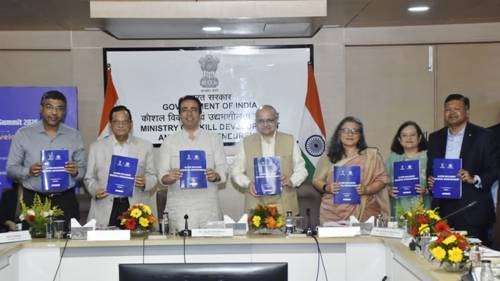NITI Aayog Launches ‘AI for Inclusive Societal Development’ to Empower Informal Workers
The report calls for immediate, mission-oriented investments in digital infrastructure, skilling platforms, and AI-driven market access models to ensure equitable growth.

- Country:
- India
In a major stride toward realizing India’s Viksit Bharat 2047 vision, NITI Aayog today unveiled its groundbreaking study, “AI for Inclusive Societal Development,” developed under the Frontier Tech Hub initiative in collaboration with Deloitte. The report was launched by Shri Jayant Chaudhary, Minister of State (Independent Charge) for Skill Development & Entrepreneurship and Minister of State for Education, along with Shri Suman Bery, Vice Chairperson, NITI Aayog.
The event was graced by several eminent dignitaries including Smt. Debashree Mukherjee, Secretary, Ministry of Skill Development and Entrepreneurship; Ms. Vandana Gurnani, Secretary, Ministry of Labour and Employment; Shri S. Krishnan, Secretary, Ministry of Electronics and Information Technology; Mr. B.V.R. Subrahmanyam, CEO, NITI Aayog; and Ms. Debjani Ghosh, Distinguished Fellow, NITI Aayog and Chief Architect of the Frontier Tech Hub. Their collective presence underscored the government’s unified commitment to leveraging technology for inclusive development, productivity enhancement, and digital empowerment across India’s vast informal workforce.
Focusing on the Backbone of India’s Economy
The report is a first-of-its-kind exploration into how Artificial Intelligence (AI) and frontier technologies—including blockchain, immersive learning, and quantum applications—can improve the lives of India’s 490 million informal workers, who constitute nearly half of the nation’s GDP but remain largely outside formal systems of security and opportunity.
While the global discourse on AI has predominantly centered around white-collar employment and automation in the formal economy, this study boldly shifts the narrative toward India’s informal sector, the true foundation of its growth and resilience. It emphasizes how AI-driven interventions can help create equitable opportunities, ensure skill inclusivity, and strengthen productivity across grassroots industries and communities.
A Roadmap for Inclusive Growth: Mission Digital ShramSetu
To operationalize the insights from the study, NITI Aayog has proposed a bold initiative titled Mission Digital ShramSetu—a national mission aimed at building an enabling ecosystem where AI becomes accessible, affordable, and impactful for every worker, regardless of geography or gender.
The mission seeks to:
-
Leverage frontier technologies such as AI, blockchain, and immersive learning to tackle long-standing barriers like financial insecurity, lack of market access, and inadequate skilling opportunities.
-
Integrate digital skilling with employability, ensuring that workers—whether artisans, farmers, healthcare aides, or gig professionals—have adaptive and demand-driven learning opportunities.
-
Promote digital dignity, positioning technology as a tool for empowerment rather than exclusion.
Mission Digital ShramSetu envisions a collaborative, multi-stakeholder model, uniting government, industry, academia, and civil society to collectively address the complex challenges of informal employment and accelerate India’s transition into a digitally inclusive economy.
Leadership Speaks: A Shared Vision for Empowerment
In his address, Shri Jayant Chaudhary described the report as both a blueprint and a moral commitment to India’s workforce:
“Empowering India’s informal workers is not just an economic priority—it is a moral imperative. The goal of Digital Skilling in AI for workers aligns perfectly with our national skilling agenda. By bringing together government, industry, and civil society, we can ensure that every worker has the skills, tools, and opportunities to thrive in tomorrow’s digital economy.”
Mr. B.V.R. Subrahmanyam, CEO of NITI Aayog, emphasized the urgency of unified action:
“If we are serious about transforming the lives of India’s 490 million informal workers, collaboration is non-negotiable. From reducing the cost of frontier technologies to enabling innovation and large-scale skilling, every stakeholder must act together to turn adoption into true empowerment.”
Adding further insight, Ms. Debjani Ghosh, Distinguished Fellow at NITI Aayog, stated:
“For India to achieve its $30 trillion Viksit Bharat 2047 goal, we cannot leave behind the 490 million workers who power our economy every day. This roadmap is unique—it places their voices and aspirations at the heart of the AI conversation, outlining a mission-mode approach to make technology work for everyone.”
The Call for Urgent Action
The roadmap stresses that delays in AI adoption and digital skilling could have long-term consequences. If current trends persist, the average annual income of informal workers may remain around $6,000 by 2047, well below the $14,500 benchmark needed for India to achieve high-income nation status. The report calls for immediate, mission-oriented investments in digital infrastructure, skilling platforms, and AI-driven market access models to ensure equitable growth.
Human-Centric AI: The Core Message
A central tenet of NITI Aayog’s Frontier Tech Hub initiative is that AI alone cannot drive transformation. Technology must be supported by intent, human oversight, and robust ecosystems that prioritize inclusion and ethics. The report underscores that AI for societal development must be rooted in empathy, collaboration, and sustainability.
By ensuring that AI addresses real-world challenges—such as informal workers’ access to markets, financial stability, and safety—India can set a global benchmark in human-centric AI adoption.
Toward Viksit Bharat 2047
As India strides toward becoming a $30 trillion economy by 2047, the AI for Inclusive Societal Development roadmap offers both vision and direction. It reflects NITI Aayog’s continued leadership in fostering innovation that is equitable, participatory, and transformative—anchored in the belief that technology must serve every citizen, not just a privileged few.
To access the full roadmap and recommendations, visit: 🔗 NITI Aayog: Roadmap on AI for Inclusive Societal Development










